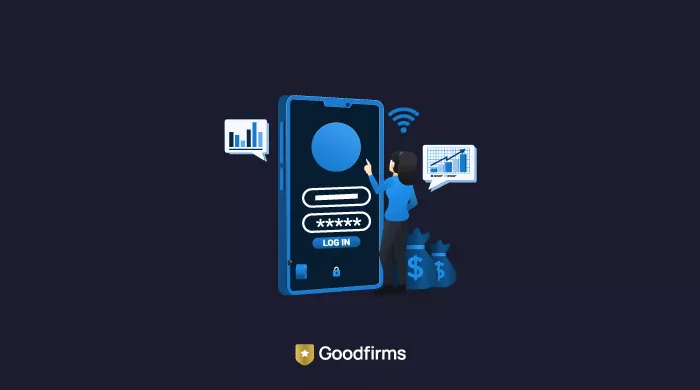Developing a hybrid app is no longer rocket science these days. There are several hybrid app development frameworks out there which help develop and deploy flawless hybrid apps at minimal cost and time. Frameworks provide developers with all the tools and guidance they require to build an app. That said, there’s nothing like one-size-fits-all.
Businesses have to choose their framework based on their requirements and budget constraints. Among other things, they need to consider the range of target audience, type of project, the developer's experience level, type and experience of the app development company.
Presently, Ionic, React Native, Xamarin, Flutter, Native Scripts are some of the well-known and heavily used frameworks.
All frameworks have certain pros and cons, so developers need to sort out their project requirements and choose the framework that will match those needs. In this post, we'll look at some of the top hybrid app development frameworks and their key features.
This post will help developers note key features of top frameworks making it easier for them to find the perfect match for their hybrid app development needs. So, let's move forward and look at some hybrid app development frameworks and highlight their key features.
Top 5 App Development Frameworks for Hybrid App Development
Ionic
Ionic is a well-known mobile app development framework that helps create hybrid and cross-platform apps. Launched in 2013 by Max Lynch, Ben Sperry, and Adam Bradley, this framework is open-source and free to use.
The Ionic framework is based on web technologies like HTML, CSS, Javascript and allows developers to develop hybrid apps using these languages, which also happen to be the most common language known to almost all developers.
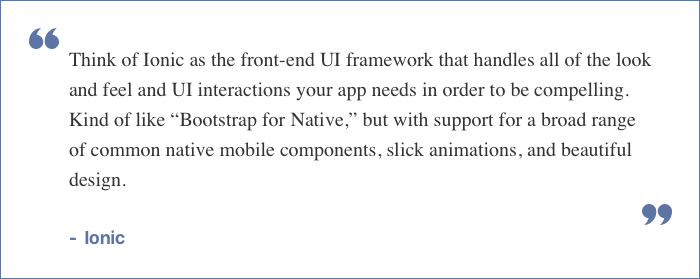
According to creators, Ionic is a kind of front-end UI framework that deals with all of the app's aesthetics; in other words, the look and feel, along with other UI elements that help create a rich and unique app. And to give the hybrid app a native-like feel, the framework supports the access of all the native features of mobile to the app.
As we all know, hybrid apps are web apps that are further shelled inside a native app-like structure. Due to which they have both web-app-like as well as native-like features.
In order to help create a hybrid app that runs and feels almost like a native app, the Ionic framework supports specially designed native-styled mobile UI elements and layouts that are usually not seen in web apps but are common in native apps.
As already mentioned, Ionic is a framework built using web technologies such as HTML, Javascript, and CSS, which is why it supports the development of hybrid apps that are part web apps. But to give these apps a native shell, the ionic framework needs a native container such as Cordova or PhoneGap.
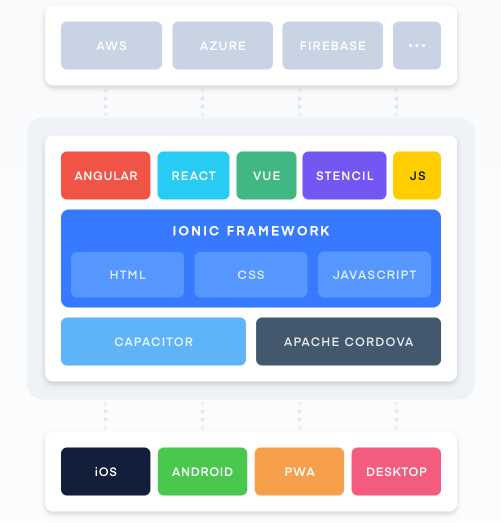
Source: Ionic
The Ionic framework is very often updated, and as of now, the most recent version of this framework is known as Ionic 5 (Magnesium). Today, the Ionic framework supports its integration with various other frameworks such as React, Angular, Vue, and many more. Developers now have access to more toolsets to create a rich hybrid app.
Using the Ionic framework, hybrid apps can be developed that support the most common operating systems found these days, iOS and Android. Although it's easy for professional developers to develop apps using this framework there are multiple Ionic app development companies available in the market that can be hired in order to get apps built in less time.
After considering recent advancements and developments in the framework, it has been seen that hybrid apps developed using these frameworks are better in performance than other hybrid apps. Especially with integration with other frameworks such as Angular JS, Ivy Ionic now supports hybrid app development with more robust features and beautiful design and graphics.
Key Highlights:
- Ionic 6 is the newest and most advanced version of the Ionic app framework also known as Unobtainium.
- Ionic 6 now supports more interactive and rich UI for hybrid apps using icons library like Ionicons and newly added set of vibrant colors
- Improved performance of Ionic 6 apps through support and integration of other frameworks such as Angular JS, Ivy, etc.
Xamarin
Xamarin, launched in 2011 and owned by Microsoft, is an open-source app development framework. Xamarin offers developers a lucrative platform for hybrid app development for iOS and Android devices using C# and .NET.
.NET is also an open-source app development platform created by Microsoft that can be used to develop many applications for windows and is usually distributed or available as a package in every windows operating system. .NET is very popular amongst developers because of its rich class library also known as .NFT Framework class library.
Xamarin, with its integration with the .NET platform, offers a powerful tool to developers for creating hybrid apps with native-like features. Xamarin brings .NET platforms to its framework and extends the benefits of .NET to be used by hybrid app developers.
When a developer chooses the Xamarin framework for hybrid app development, he gets to use exclusive platform-specific libraries, which also come with access to APIs from Google, Apple, Facebook, etc., as described by Microsoft.
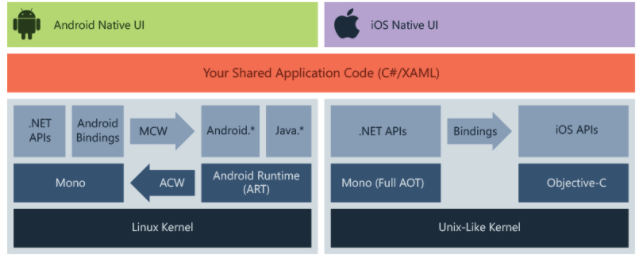
Fig: Architecture of a cross-platform Xamarin Application
The code reusability feature of Xamarin allows developers to use the C# language to write the codebase and then use it for creating apps for multiple operating systems, including iOS and Android.
Xamarin.form is one of the versions of Xamarin that allows developers to build hybrid apps with native-like features using the same code written in C# language for multiple operating systems. Xamarin.Forms 5.0 is the newest version and comes with newly added fascinating features such as App themes (Dark and Normal mode), Swipe View and much more.
Considering all the points, we can say that it's advisable to use the Xamarin framework for hybrid app development or hire Xamarin app development companies to save time and create a multi-platform compatible app at the lowest cost.
Key Highlights:
- Xamarin.forms, a special version of Xamarin framework, allows developers to develop apps for multiple operating systems such as iOS, Android and Windows.
- Xamarin.forms boosts the code reusability feature of the Xamarin framework.
- Xamarin.forms 5.0 now supports both Android 12 and iOS 15 operating systems.
Flutter
Flutter is yet another open source app development framework developed by Google, garnering lots of attention for hybrid app development. Initially released in 2017, Flutter supports app development for multiple platforms, including iOS, Google, Mac, Windows, Linux, web, and many more using a single codebase developed using Dart language.
Flutter apps are built using Dart language and support some of the best features unique to the language, such as an ahead-of-time(AOT) compilation. Ahead-of-time compilation features allow dart code to be compiled into machine code during the build-time (when the program is being written) so that the compilation need not be done after downloading the app and hence resulting in less work to be performed during run-time.

As the compilation is done during the build time, it doesn't affect the speed of execution of the program, which is the case when it's compiled in run-time. Hence as the speed of the execution of the program is comparatively faster, the app runs faster, which is an essential thing for hybrid apps.
Other than this, the single codebase for multiple platforms saves considerable time for developers. Flutter's yet another important feature called "Hot Reload" allows developers to view the immediate effect of changes made, thus allowing you to add and delete features, UI designs, and much more and see its effect in real-time.
Moreover, Flutter comes with a range of widgets and classes that help you create responsive UIs that can adapt to all types of devices, be it a smartwatch, smartphones, foldable, tablets, etc., without working individually on UI for every kind of device.
Furthermore, making it more convenient for developers, Flutter allows them to use the editors they are comfortable with, using editor plugins. It's advisable for developers to use Flutter for quick and efficient hybrid app development with responsive and adaptive UIs that enrich the user experience.
Check out the list of top Flutter app development companies prepared by Goodfirms in order to get your hybrid app built by professionals in less time and promising quality.
Key Highlights:
- Flutter largely benefits when it comes to app performance from the AOT compilation feature of Dart language that allows it to compile the codebase in build time instead of runtime.
- Flutter 2.8 is the latest version of this framework that greatly improves the performance and user experience of the flutter apps.
PhoneGap/Apache Cordova
PhoneGap, now known as Apache Cordova, is a well-known hybrid app development framework formerly owned by Nitobi and now under Adobe Systems. Apache Cordova is considered one of the best and most reliable hybrid app development tools for developers of all experience levels, beginner to professional.
Apache Cordova allows developers to use web technologies such as HTML5, CSS3, JavaScript to develop hybrid apps. Using this framework, hybrid apps can be created for multiple platforms, including iOS, Android, and Windows. All the apps developed using the web technologies are then put inside a native container respective to the platform.
Apache Cordova provides the same amount of flexibility to developers as other frameworks discussed before when it comes to deploying an app on more than one platform without altering the app for each platform's different requirements.
The most striking feature of Apache Cordova is Web-view; it's a special browser window wrapped inside the native mobile platform. The layout rendering is done by web-view instead of the native UI, even though it's packed inside the native container and distributed as an app. These apps have access to all the native APIs and OS APIs such as graphics, sensors, inputs, and services.
This framework comes with a set of plugins that Phonegap app developers can add to their applications. Cordova provides a set of plugins called Core Plugins that help the device to access the device's features such as camera, contacts, storage, battery, GPS, etc.
Apart from core plugins, Cordova also allows developers to use third-party plugins or develop them themselves. Plugins help extend the features and functionalities of an app by providing an interface to Cordova or, say, the app and native components to communicate.
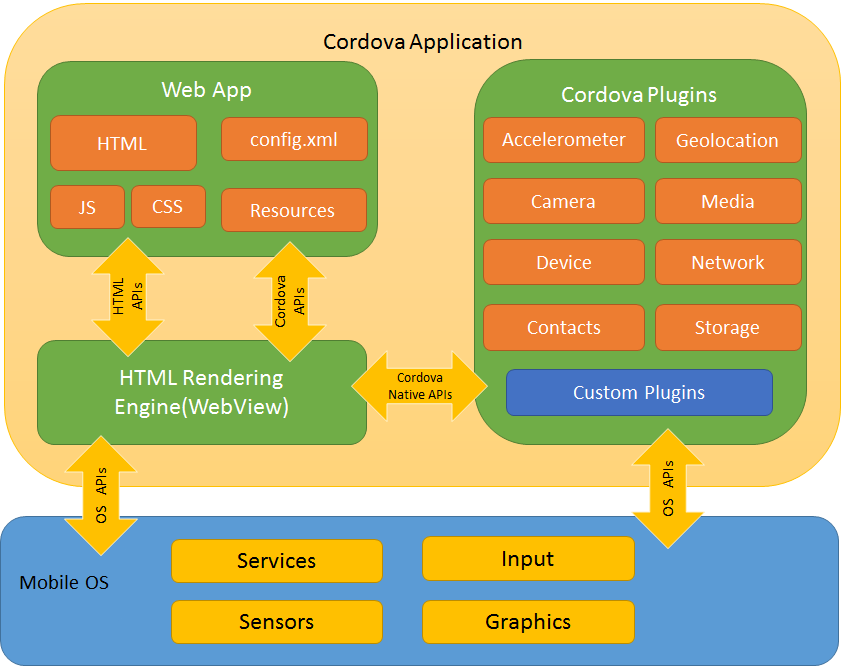
Source: Apache Cordova
Apache Cordova is a relatively easier framework for developers to work with and develop rich mobile apps. The only drawback I see in this framework is that due to excessive use of web-based technologies and as the code runs inside the web view component, these apps might run slower than compared to native apps with the same functionalities. But the ease of hybrid app development for multiple platforms it provides to the developers outshines the drawback of this framework.
Key Highlights:
- Apache Cordova is the open source version of the PhoneGap framework rebranded by Adobe Systems.
- Apache Cordova 11.0.0 is the newest version of this framework that improves much of the problems related to UI and performance to a great extent.
React Native
React native is again an open-source UI software framework developed by Meta, formerly known as Facebook. It enables you to create hybrid apps for various platforms such as iOS, Android, Windows, Mac, etc.
The react native developers can use React, a javascript library maintained by Meta, to build UIs. This framework allows developers to develop natively rendering apps which means your app will render using native APIs or, say, host platforms APIs, unlike Apache Cordova other hybrid app development frameworks that use the web view to render.
These natively rendering mobile apps made using React Native, look and feel truly native. Moreover, the performance of hybrid apps developed using these frameworks is far better than those made using Cordova and Ionic, which render using web views.

The hybrid apps made using React Native have direct access to host platforms native elements such as cameras, storage, GPS, etc., and hence feel more like native apps.
React Native framework allows faster hybrid mobile app development thanks to their code reusability feature across various platforms. The same codebase can be used for both iOS and Android platforms by using platform-specific components for minor changes.
To make a rich hybrid app full of interactive features and functionalities, React Native allows you to use external third-party libraries such as NativeBase, Lottie for React Native, React Native Maps, and many more.
Key Highlights:
- React Native developed by Meta is the extension of React, a javascript library to an entire framework that allows developers to build native like apps.
- React Native helps app developers to build hybrid apps that match the performance of Native apps by performing native rendering.
- React Native allows developers to create better and rich UIs using third party libraries such as NativeBase, Lottie, etc.
- React Native 0.66 is the latest version of this framework which extends support to the latest operating systems Android 12 and iOS 15.
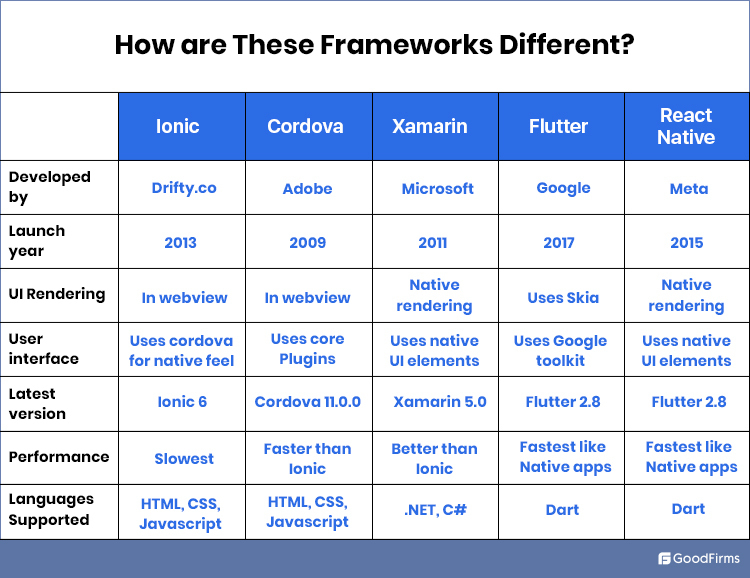
Summing Up
There are a number of app development frameworks available for developers, but not all of them are suitable and convenient for building hybrid apps. Every app development framework comes with its pros and cons. While some support app development for a single platform, say iOS, others allow multi-platform support.
Based on my research for this post on top 5 app development frameworks, what I found was that certain features such as code reusability, programming languages, access to native features of the device, etc., are common to almost all the frameworks, while many make them distinct from each other.
For example, apps made using frameworks like Ionic and Apache Cordova run in web view, making their performance slower than their native counterparts. While React Native framework offers app development in which instead of the web view, the UI component of the app is directly bridged or has access to the device's native UI views, thus allowing native rendering.






